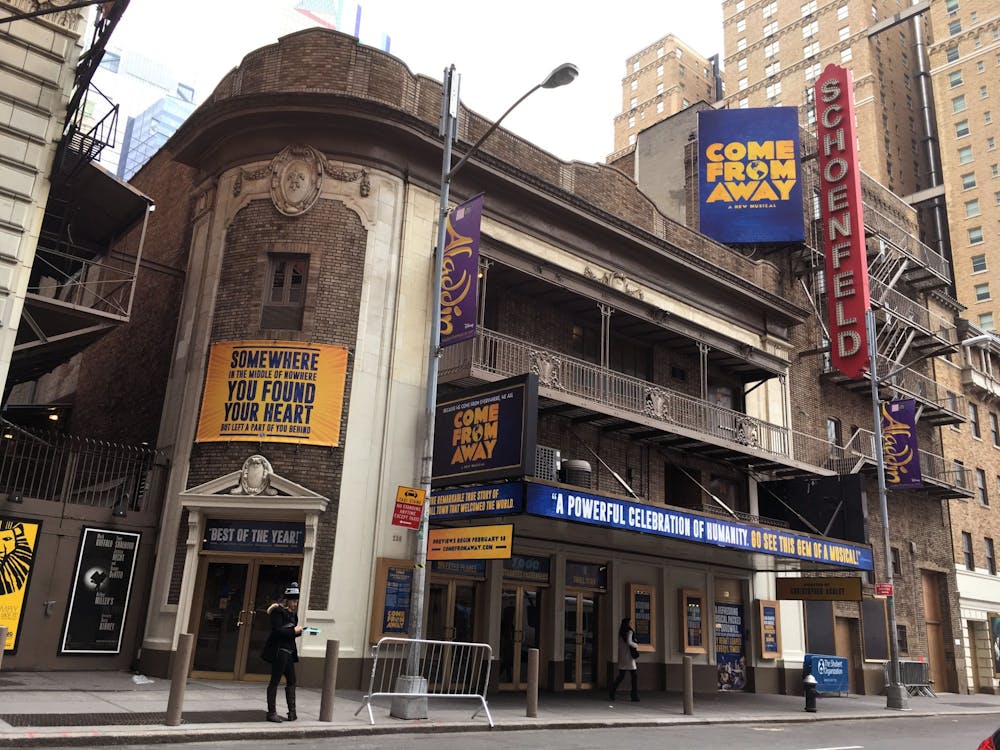It's not until about half way through its runtime that Come From Away gives a firm indication of when it takes place. Even so, everybody knows by the end of the first song. The musical, written by Canadian composers and lyricists Irene Sankoff and David Hein and currently visiting Philadelphia on its national tour, tells the story of the aftermath of 9/11 through the lens of Gander, Newfoundland.
Gander is a small Canadian town that, in 2001, had a population of around 9,000 people. Before jet planes were able to make it across the Atlantic Ocean on one tank of fuel, they all stopped at the Gander airport to refuel. In the chaos that ensued after the attack on the Twin Towers, the United States closed its airspace for the first time in history, and 38 planes, each with at least 250 people on board, were forced to land in Gander. Overnight, the town of 9,000 people grew to over 17,000. Come From Away tells the story of the locals and the “plane people” who were were suddenly thrust together for five days in the wake of a tragedy.
The story of these 17,000 people is told by twelve actors who each play several roles, all of which are based off of real people involved in the situation that took place eighteen years ago in Gander. While preparing for the inaugural production at Sheridan College in Hamilton, Ontario, the creative team interviewed the real people the musical is based upon and attempted to replicate their stories as authentically as possible on stage.
The entire twelve–person ensemble gives a myriad of strong performances, from Sharone Sayegh—the determined SPCA worker Bonnie—to Chamblee Ferguson, who flawlessly traverses back and forth between Newfoundland and British accents as he plays the Gander air–traffic control coordinator and a British businessman who forms a deep connection with a fellow passenger named Diane.
Danielle K. Thomas gives a beautiful performance as Hannah, a mother from New York City whose son is a firefighter who dies in rescue efforts. Meanwhile, James Earl Jones II shines in his strong portrayal of Bob, who, though initially skeptical of the Newfoundlander’s kindness, ends up kissing a codfish to become an honorary Newfoundlander.
The music itself is always present in the piece. Though the show is not completely sung–through, the dialogue is sparse and, even in the moments of spoken dialogue, the on–stage musicians continue to play and evoke the surreal atmosphere of the town. The wail of the maritime fiddle alongside the enthralling beats of the bodhrán drum fill the cavernous space of the Academy of Music— which feels almost too large for such an intimate production—and touches every member of the sold–out 2,500 person audience.
Like all productions, however, the tour of Come From Away has its faults. More than a few of the jokes fall flat, but it's hard to tell whether that's due to the jokes themselves, or just the amount of time that's passed since the musical’s inception. The self–deprecating quips about Canadian hospitality and iconic institutions, such as Shoppers and Tim Hortons, all get laughs. So does the young reporter, played with genuine eagerness by Julia Knitel, and her relatable struggles starting a new job. However, some of the jokes that follow more topical moments struggle to land.
The musical was only written in 2013, but so much chaos has ensued in the past six years that the audience seemed to be a bit on edge at some moments. There are unfulfilled pauses for laughter in moments that follow scenes in which Ali, an Egyptian passenger on one of the diverted planes, is the target of Islamophobic backlash and when Bob, a Black man from Queens, is scared he’ll be shot when the mayor asks him to steal barbecues for a cookout (instead, he is asked inside for tea by each barbecue owner).
To be clear, the musical is not trying to make light of either situation. Instead, it tries to find a balance between the various human reactions to tragedy by highlighting the thin line between fear and absurdity. The desired reactions, however, are inhibited by the lingering tension left by the more topical politics that thread themselves throughout the play.
I saw Come From Away on Broadway a couple of years ago, and I remember that people did laugh when they were “supposed to.” Though the US presidential election had already taken place, it was still a time when many people had hope that things would not go as far as they have, and this musical was still able to function as an escape. That doesn't seem to be the case anymore. Although current societal and political issues that are present in this musical may detract from the comedy, they heighten its emotional impact.
After the “plane people” finally leave on Sept. 15, 2001, they and the citizens of Gander sing a song called “Something Missing,” in which they try to reflect on the five days they just experienced, only for them to realize they don’t know what to do. During this song, both the elderly man to my left, who started using his phone at one point earlier on in the show, and I, a 20–year old who has no memory of 9/11, were reduced to tears which did not cease until the end of the show—and we were not the only ones. In the end, Come From Away is a story about human connection and the strength that we can find in one another in the aftermath of tragedy. For that reason, sniffles and furtive rubbing underneath eyes demonstrated that audience members in all five tiers of the theater were equally moved.

